HIT CHANNEL INTERVIEW: April 2024. We had the great honor to talk with a legendary bass player: Alphonso Johnson. He is best known as a member of Weather Report and he has also played with Carlos Santana, Phil Collins, Steve Hackett, The Other Ones, Billy Cobham, George Duke, Chet Baker, Allan Holdsworth, Billy Childs Electric Quartet and others. He is currently touring with Jazz Is Dead performing the music of Grateful Dead live. Read below the very interesting things he told us:
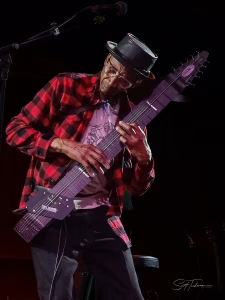 What should fans expect from the upcoming Jazz Is Dead tour?
What should fans expect from the upcoming Jazz Is Dead tour?
I think we always try to have a few surprises, so we will probably add some songs that we haven’t played on a tour yet. Just the arrangements are improvised, so we usually figure that out at soundchecks, so it’s still fresh for us as well as the audience.
Is it intriguing for you to play the music of Grateful Dead in jazz style with Jazz Is Dead?
Yeah, it’s very intriguing to be able to take someone’s music and apply a different style or a different arrangement to it.
Did you feel a lot of pressure when you replaced Phil Lesh (Grateful Dead -bass) in The Other Ones in 2000?
Yes (laughs), because I didn’t want to play like Phil Lesh, obviously. So, I wanted to find a way to still connect with the songs, so the fans would still recognize the songs without me taking it too far away from the original arrangement. But still I wanted to be able to add my own style on the music.
Are there any other projects you are currently involved with?
I have a small tour with Billy Childs Electric Quartet in Tokyo in May. We are going to play at the Tokyo Blue Note for three nights.
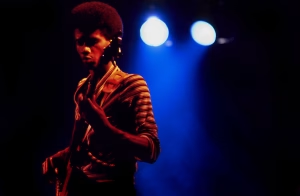 I love your playing on “Nubian Sundance” from Weather Report’s “Mysterious Traveller” (1974). Could you please tell us everything we should know about this?
I love your playing on “Nubian Sundance” from Weather Report’s “Mysterious Traveller” (1974). Could you please tell us everything we should know about this?
Ah! That’s a very interesting song. That song was recorded pretty much when I first came out to audition for the band. So, I really didn’t have any idea of what we were going to be recording or playing; they didn’t let me know in advance. So, I just showed up at the studio, plugged my bass and what you hear on the recording is what happened.
Was Joe Zawinul (Weather Report -keyboards) an easy-going person to work with?
Always. Yeah, Joe was a sweetheart. You know, he had definitely a strong personality and he knew what he wanted musically, but he was a really great human being.
Please tell us a few words about Wayne Shorter (Miles Davis, Weather Report –saxophone) who passed away last year.
Yes. Wayne Shorter was also a very brilliant musician and just a wonderful person to know. Wayne Shorter was always very particular about having his music interpreted the way that he wrote it, that was very important to him. But he also wanted the musicians to take it to another step beyond what’s on the paper.
What’s the story behind your departure from Weather Report to join Billy Cobham (Mahavishnu Orchestra, Miles Davis -drums) and George Duke (keyboards)?
I knew once I met Jaco Pastorius that he was gonna become the next bassist in the band. So, I had gotten a call from George Duke -we became really good friends- and so at the same time he told me that they were gonna be looking for a bass player, so I figured that it would be a good time for me to make the move.
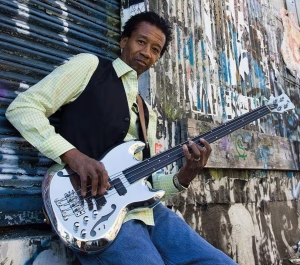 How much has your approach to bass changed over the years?
How much has your approach to bass changed over the years?
Ah, good question. I really don’t know if I know the answer to that. Maybe, I am probably being more particular about the details of the music than I was before.
What was your first reaction when you listened to Jaco Pastorius’ playing in Weather Report?
It sounded amazing. He was really-really good bassist. I felt sometimes he was a little busy, but that’s just my taste and my style. But he was brilliant.
Was it an interesting experience to play with Carlos Santana and Wayne Shorter at the Montreux Jazz Festival in 1988?
That was a really great experience. I remember when we went to play a song called “Cavatina”, when I picked up my Chapman Stick, the heating from the lights had stretched my strings and lowered the tuning, so when I played the first melody nobody could join me because I was out of tune, except Wayne Shorter stepped up to the front of the stage and he adjusted his mouthpiece and we finished the song together.
Do you have any memories from your concert in Greece with Santana in 1988?
Yes, that was a very beautiful concert, I just thought it was amazing. It was almost like we had two bands on the stage: One side of the stage with Patrice Rushen (keyboards), myself and Wayne Shorter and then the other side of the stage with Chester Thompson and Carlos Santana. So, it was an interesting juxtaposition.
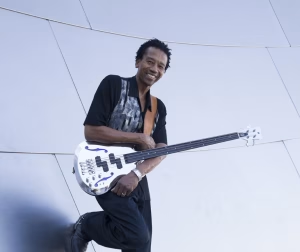 How did it happen to play on Phil Collins’ “Face Value” (1981) album?
How did it happen to play on Phil Collins’ “Face Value” (1981) album?
I met Phil Collins in Hollywood, at the hotel that they were staying. I was there to visit Chester Thompson actually and Phil and I met on the elevator. So, we exchanged numbers and he got in touch with me and asked me to play on his solo record.
You also played on Steve Hackett’s “Genesis Revisited” (1996). How did it come about?
Chester Thompson was a good catalyst for me connecting with Steve Hackett. When I spoke with Steve, he specifically wanted me to play on certain tracks (ed: “Dance on a Volcano” and “Fountain of Salmacis) to try and add my style of playing to that music.
How important is improvisation to you?
We all improvise in conversations, in the way that we interact with each other and with the nature. We are always improvising.
When and how did you start playing the Chapman Stick?
Around the time that I came to Los Angeles in 1976, is when I met Emmett Chapman (ed: the inventor of Chapman Stick) and he agreed to give me an introduction to the instrument and then I just started playing it at home.
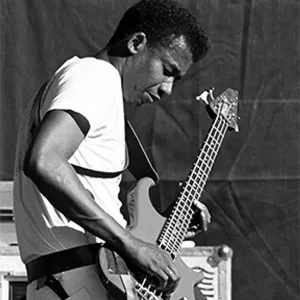 Who are you influences as a bass player?
Who are you influences as a bass player?
Wow! Tony Williams (drums), Scott LaFaro, Monte Montgomery (guitarist), Grover Washington Jr. (saxophone, flute), Ron Carter, Georg Duke, I can go on and on…
Is it flattering that you influenced great bass players such as Percy Jones (Brand X, Brian Eno) ?
I don’t know how to answer that (laughs). That’s a big compliment to know that people are listening to what you are doing and they feel influenced by your choice of music.
You have played with many different people in your career. Is playing with different people a kind of evolution too?
Yes, I think so. I think it’s important to always challenge yourself and to try and do new things that involve a new environment and you must surround yourself with musicians that are creative.
Miroslav Vitous (Weather Report -bass) told me that jazz in dead, jazz is finished, because there aren’t great musical personalities like Wayne Shorter and Herbie Hancock anymore. Do you agree with this?
No (laughs). I don’t think that jazz music will ever be dead. You just have to go out and listen to current new bands and musicians and I think you ‘ll find that is very much alive and especially in Europe, New York and Japan. There are so many really amazing musicians playing now.
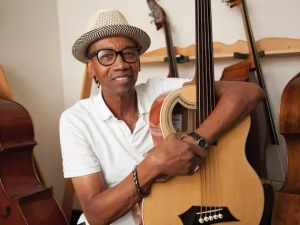 Tony Williams came from Boston and joined Miles Davis when he was 17 years old. Are there those kinds of opportunities nowadays?
Tony Williams came from Boston and joined Miles Davis when he was 17 years old. Are there those kinds of opportunities nowadays?
I think so. I think they are yet to be discovered. It’s important to listen to the music of today; a lot of it it’s on Youtube, so that’s where you find a lot of the newer musicians.
Do you think because of the streaming services listening to an album from start to finish is now becoming a kind of lost art?
I’m afraid so. I think because of technology a lot of people today have a shorter attention span and so it’s very difficult for them to find a time to sit and listen to music for maybe more than 15-20 minutes.
Ron Carter (Miles Davis Quintet) told me: “The first take in the studio is always the best, because the first time you play the music, the second time you play yourself”. Do you agree with this?
Yeah, I think that’s true. The first time you are playing fresh, like a newborn baby and sometimes the second time you are just trying to repeat what you did before.
Please explain to us your “don’t make assumptions” philosophy?
(Laughs) Basically, it’s part of a philosophy that I have adopted from reading “The Four Agreements” (ed: by Don Miguel Ruiz -1997) and “don’t assume” is one of the four agreements. It’s very important to realize how valuable that is.
Is there right or wrong in jazz?
No. There is music and there is non-music.
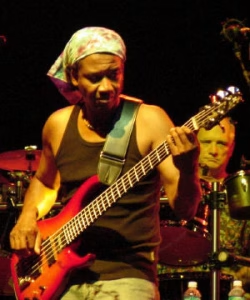 By the way, Bill Evans, the saxophone player (Miles Davis) told me recently that there is no personal character in smooth jazz, all the players sound the same. Do you agree with this?
By the way, Bill Evans, the saxophone player (Miles Davis) told me recently that there is no personal character in smooth jazz, all the players sound the same. Do you agree with this?
I think it’s true. It’s kind of an easy-listening style, mostly for people who aren’t really into jazz, they want background music.
Would you like to share with us the albums that had a deep effect on you?
Definitely, Tony Williams Lifetime, Monte Montgomery’s solo records, all the Motown recordings (laughs) with James Jamerson (bass). I think they had a really strong effect on my style of playing.
Do you have any musical ambitions left?
Yeah, I wanna keep growing as an artist and be happy with the music that I ‘m playing.
Are you making music for a new solo album?
No. No, I’m not currently recording anything, right now. I ‘m looking to the things that I have booked for the year, which is to tour with Billy Childs and Jazz Is Dead.
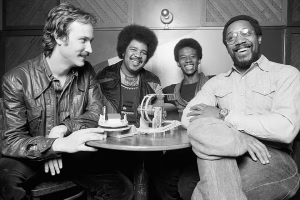 Who is the musician you have the best musical connection with on stage?
Who is the musician you have the best musical connection with on stage?
Ah, wow! Probably the Cobham-Duke band with John Scofield (guitar). That was I think one of the most connected performances that I have experienced.
I did an interview some months ago with Jorma Kaukonen (Jefferson Airplane, Hot Tuna -guitar) and he said that as you grow older as a musician you find yourself following more rules. Do you agree with this?
(Laughs) I think it’s different for everybody. It depends on what you consider rules.
A huge “THANK YOU” to Mr. Alphonso Johnson for his time.
Official Alphonso Johnson website: https://www.embamba.com/
Official Alphonso Johnson Facebook page: https://www.facebook.com/AlphonsoJohnson.OfficialPage

